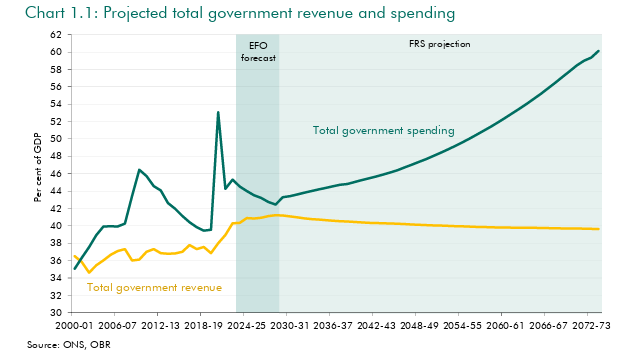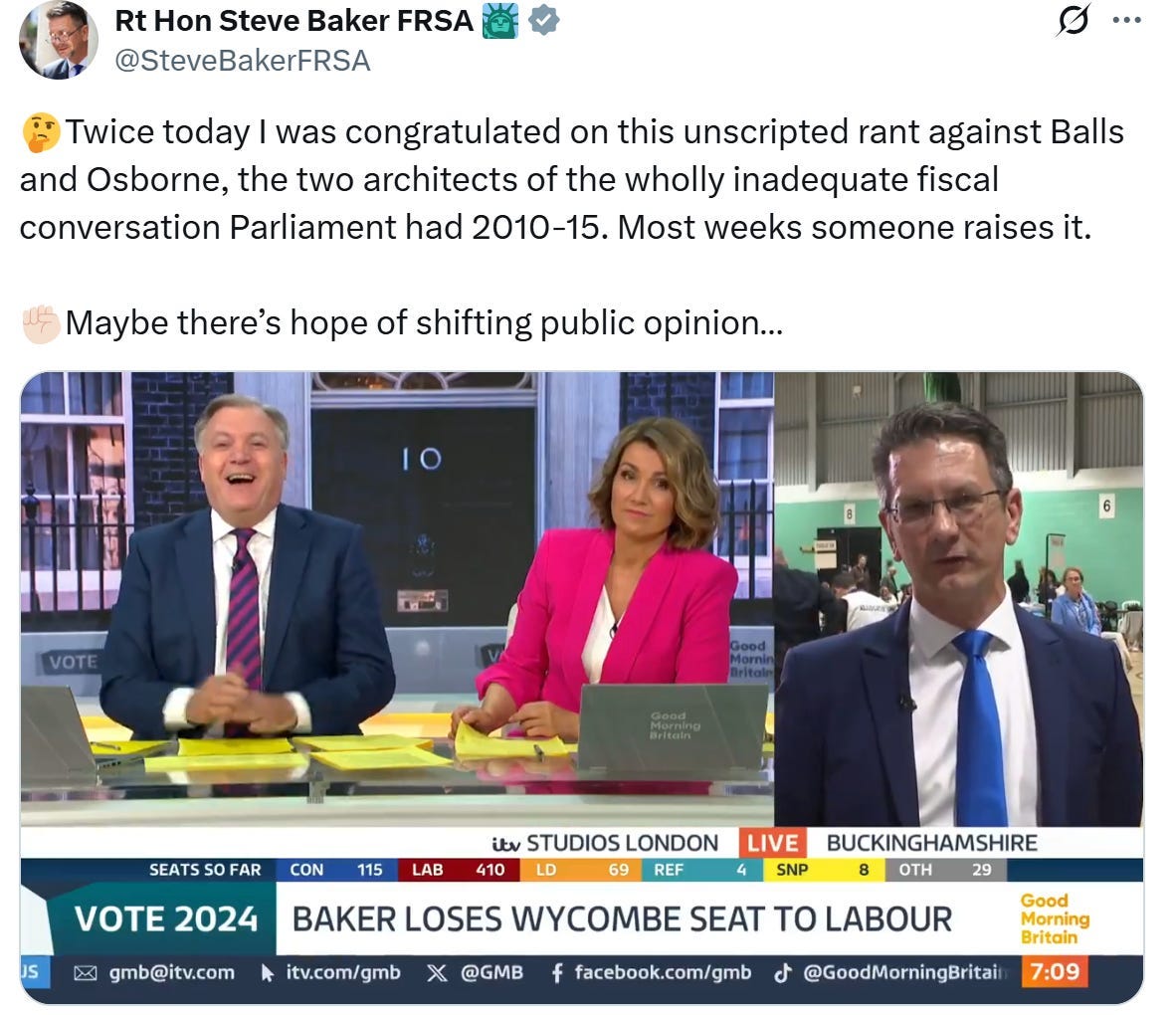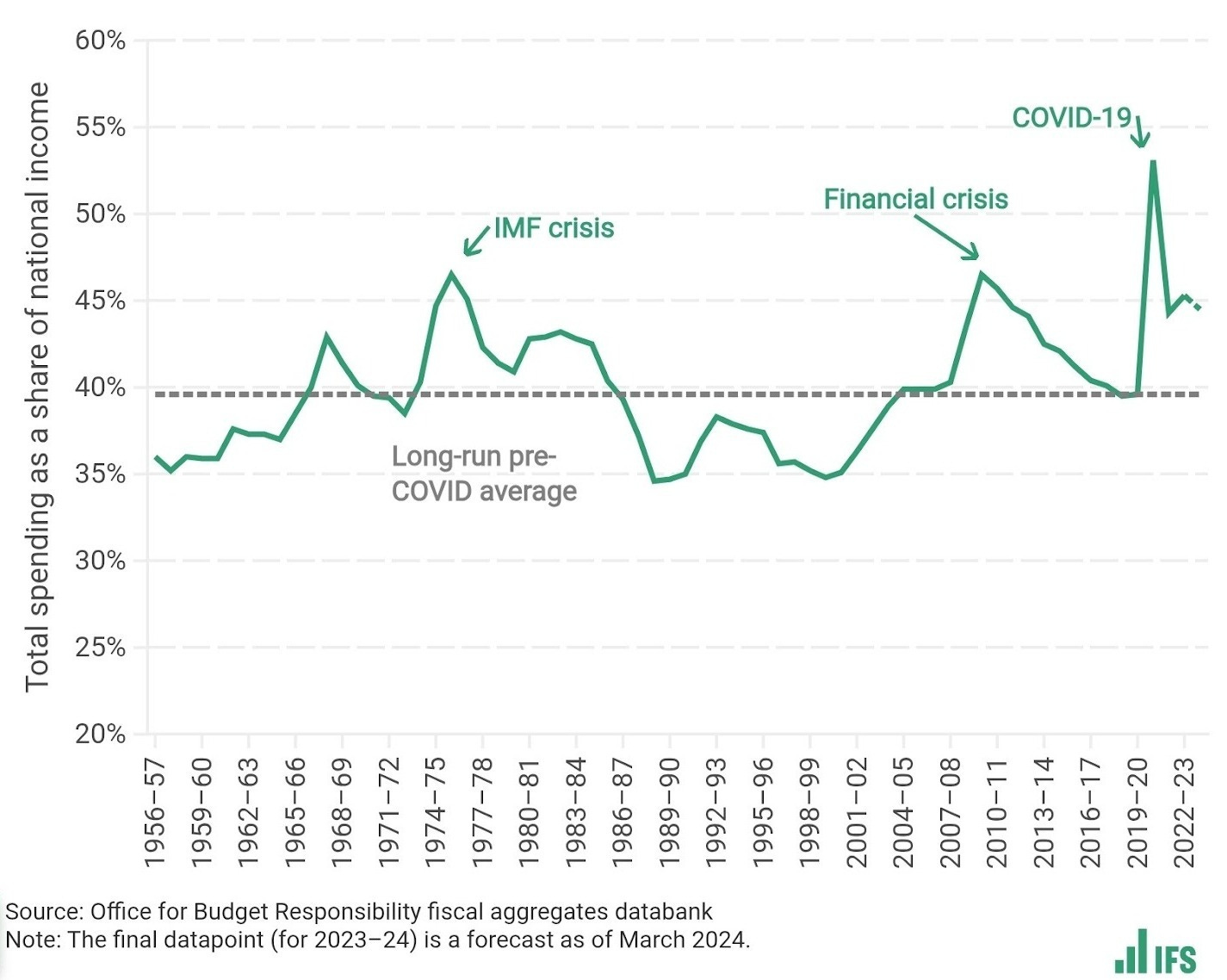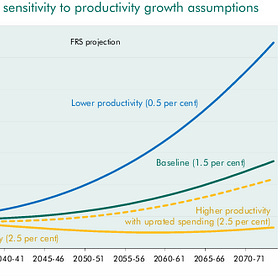Why are we Fighting for a Free Future? Britain's moment of truth is coming
The choice before us is stark: voluntary reform now or involuntary collapse later. Lead the world, or be one of the many once great countries whose economic history details its downfall.
Civilisation is not inherited; it has to be earned by each generation. - Friedrich A. Hayek
First, some news from the Director of Fighting for a Free Future, Harry Richer: We are very excited to announce the expansion of Voices for a Free Future’s output. Alongside the revamp of the Fighting for a Free Future Substack to Voices for a Free Future, our free subscribers will now receive monthly articles written by Steve Baker and weekly guest articles written by key figures across Westminster and the next generation of political thinkers.
Paid subscribers will receive exclusive weekly articles written by Steve Baker and paid subscriber-only articles written by the FFF Team. Paid subscribers also receive exclusive clips from the Insurgency with Steve Baker podcast and audio newsletters, alongside other unique perks.
The United Kingdom stands at the precipice of economic catastrophe. We are not just facing another downturn or cyclical adjustment; we are witnessing the terminal decline of an entire model of the state that has dominated British political life for decades. In this post, I will detail the deep-seated serious problems facing the UK, reflect on my own experiences of the reactions of politicians to these from my time as an aide in Parliament, and discuss how we must make free markets and freedom attractive again if the UK is to ever escape the doom loop that has taken hold.
It may sound crazy, but the last Government Actuary’s Department review of the Great Britain National Insurance Fund projected that the UK will effectively default on its welfare spending commitments, including those related to pensions, in 2043-44.1
The symptoms of our decline surround us. Housing has become unaffordable for an entire generation. Real wages have stagnated or declined for millions. Public services are crumbling despite historically high taxation levels. The UK's debt-to-GDP ratio has reached 95.8%, levels not seen since the early 1960s. Interest payments on government debt have soared to £16.4 billion in June 2025, nearly double the amount paid in June 2026.2

The UK is not facing a distant economic threat: our reckoning is here. Decades and decades of state overspending, out of control public services, and rising taxation have meant that the titanic has now approached the iceberg. The time has long passed to scrub windows or take in the deckchairs: the UK requires radical and immediate action to correct the course.
Own Experiences
Does our political class know this? The answer is yes and no.
From the Left, other than a few figures at the top of the Labour Party, none are taking seriously the economic peril that we find ourselves in. It was a prophetic message when Fighting for a Free Future Chairman, the Rt Hon Steve Baker, said to George Osborne and Ed Balls on the morning after the General Election:
“Rachel Reeves is going to find that she has to do austerity, and she is going to have to do austerity with these Labour MPs who said it was a choice. It is going to be a circus.”

Whether it was the u-turn on abolishing universal winter fuel payments or the reversal of the much-needed reforms to our welfare system, the circus has been in town for a while now.
From the Right, the answer is more mixed. Of course, most MPs are somewhere between oblivious and disinterested. However, there has been a significant minority of right-leaning politicians who have tried to wake up the rest of the political establishment to the economic danger facing Britain. They should be commended for this. Each one is a hero who was willing to say what was right, regardless of whether it was popular.
Unfortunately, many politicians - who just about constitute the rest - have not had the same courage. I was a parliamentary staffer for six years. I saw firsthand the genuine care that many MPs have for our country and their heartfelt desire to improve people’s lives. I also saw firsthand numerous MPs state in private what they were unwilling to state in public: that the NHS is broken and a completely new model for delivering healthcare is required, that our pensions system will drive us to economic ruin, and that state spending is out of control. These things were easily said in private, in the abstract. But even then, when considering circumstances and their own electoral prospects, they would then make clear that they could never speak the truth at a hustings. Electoral incentives, which are of course a feature and not a flaw of the system, may explain that. But if anything, it spurs the necessity to reform the system even more urgently.
I want to reiterate that I saw this over and over and over again during my time in Parliament. Many MPs know the UK is broken; some even acknowledge the radical reforms that are required to nurse our country back to health, but they are simply not willing, or able, to articulate them publicly. After all, what is the worth of a politician who always correctly diagnoses the problem if they can’t survive long enough in office to do anything about it.
The limitations on our elected officials who wish to speak the truth but cannot are even further compounded. They are intensely lobbied every single day by single-issue pressure groups - whose causes may be just, but this matters very little if we cannot afford the basic components with which the state functions - and constituents who have unrealistic expectations of both what their MPs can do and what the government should do. And don’t get me started on the hero worship that exists for many of our institutions - we can clap for the NHS all we like, but I would prefer a healthcare system that was good at delivering healthcare.
All considered, herein lies the problem. We have an electorate unready to hear tough news and a political class unable to deliver it to them.
As an aside, the issue with many of our MPs can be summed up by the several MPs I joined for a cigarette in the smoking area of Portcullis House just before they went to vote for the generational smoking ban. A private view that is completely at odds with their voting and legislative record. Perhaps cigarettes will become our new currency when we default on our pension system and they vote to change the mandate of the Bank of England so they can effectively print money on demand to meet our domestic welfare state and international finance obligations, which will mean we are off to the races on currency collapse.
Ultimately, from both the right and the left, this has been a failure of political leadership to inspire the electorate to back these much-needed reforms. Broadly, the Left has lived in fantasy land for years and continues to do so. For the Right, they have allowed the public to live in blissful ignorance for years, terrified of their electoral response, while behind the scenes, openly saying to each other that something is fundamentally wrong.
The UK is Broken
However, we can all only live in fantasy for so long; reality will eventually hit. There is no ignoring the numbers, and they paint a devastating picture. The UK now borrows £127.5 billion annually, 4.5% of GDP. The triple lock pension policy alone will cost £15.5 billion by 2029-30, three times higher than originally forecast. Without dramatic reform, the OBR projects that over the next 50 years, the welfare state will increase in size by seven percentage points of GDP.3
The Catastrophic Consequences of our Government Spending Laid Bare
Where were you when you first realised that our public finances were on course to a catastrophic collapse?
This is not merely a question of numbers on a spreadsheet. The UK's cost of borrowing now sits consistently at the top of the G7 economies, reflecting what the OBR describes as our "relatively vulnerable" fiscal position. We are fast approaching the point where our creditors lose faith in our ability to service our debts. If we continue down our current path, that moment will come, and we will face the choice between defaulting on our obligations or debasing our currency through massive inflation.4
Our welfare system is broken. Just like our health system, it has become a black hole consuming ever-greater resources. The number of Britons claiming sickness benefits is projected to rise from 2.8 million to 3.4 million by the end of the decade. Over 9.3 million people aged 16 to 64 are economically inactive, 713,000 more people since the pandemic. The government spent £65 billion on sickness benefits last year alone, a figure projected to escalate by tens of billions before the next General Election.5
These crises are not the making of one Government or indeed even several. It is the result of decades of an ever-expanding state.
Despite political posturing, the truth is that the UK hasn’t tried the way of the small state in the post-WW2 era. Yes, there have been periods in which Governments have slightly reduced the size of the state and its expenditure, such as during the Cameron-Osborne austerity or Thatcher’s time in power. But for over 70 years, public spending as a share of national income has never fallen below 34%. Indeed, even the austerity of the 2010s only moved the UK’s state spending back to its long-run pre Covid average. This has meant that the fundamental problems that the UK faces have been growing for over 70 years.

Each expansion of state power was sold as a solution to yesterday's problems, yet each has created tomorrow's crises. The 1947 Town and Country Planning Act system was intended to promote orderly development, but instead, it has led to chronic housing shortages and economic stagnation. The welfare state was meant to provide security, but instead, it has created a demographic time bomb that threatens to bankrupt the nation. These are not isolated policy errors that can be tweaked at the margins. These 70+ years represent the delusion that politicians can override market forces, economic reality, and human nature through legislation and spending. The chickens of seven decades of statist folly are now coming home to roost, and no amount of political spin can change the arithmetic which points to our national decline.
Paradigm Shift: The End of the Social Democratic Consensus
We need nothing less than a complete paradigm shift in British politics. For over 50 years, we have operated under the delusion that the state can provide everything to everyone while somehow maintaining prosperity and freedom. This model, social democracy financed by easy money and ever-expanding debt, is collapsing before our eyes.
The relationship between state and citizen must be fundamentally reimagined. Citizens must understand that the state cannot protect them from everything, economic or social, and when it tries, it inevitably fails spectacularly. Politicians must finally be honest about what the state can afford. Can we afford our current public services? No. Can we afford our current welfare bill? No. Can we afford the NHS in its current form? No.
Despite our looming collapse, we cannot seem to achieve any meaningful reform. Minor tinkering with the pensions system to remove the winter fuel payment?6 No. Trying to bring down our benefits bill?7 Impossible. And don’t even mention reforming the triple lock. Unfortunately, our politicians and public don't have a choice. We have two paths in front of us. Voluntary reform now or involuntary collapse later.
We do not have to look far to see that voluntary reform now is not only preferable but possible. Since he was elected in November 2023, the world's only openly libertarian president has implemented a programme of radical free-market reform that provides a roadmap for Britain. This is not theoretical economics but real-world proof that free-market principles can deliver rapid, dramatic improvements in people's lives.
The results have been nothing short of remarkable. Early 2024 saw monthly inflation collapse from 25% to under 5%, while Argentina achieved a primary surplus of $2.4 billion and a fiscal surplus of $620 million; this was the first time in 123 years that Argentina operated without a budget deficit. By October 2024, monthly inflation had fallen further to just 2.7%, transforming a country that had suffered the world's highest inflation rate of 211% in 2023. Despite significant cuts to government spending and lowering or abolishing numerous taxes, Milei has still managed to increase welfare payments to cover 100% of the basic food basket through comprehensive welfare system reform.
This transformation occurred despite Milei’s supporters being in minority positions in Congress. If such a dramatic change is achievable in Argentina's challenging political environment, it is certainly possible in Britain. The question is not whether we can implement these reforms, but whether we have the courage to do so before circumstances force them upon us.
We Should All Pay Attention to What is Happening in Argentina
On 1st March, President Javier Milei delivered his State of the Nation address to the Argentinian Congress.
When I have raised the case of Argentina, I have often received the rebuke that Britain is not Argentina and that our fiscal situation is not as bad as theirs was before Milei. Both statements are true but both statements fail to recognise that Britain must take action now before we become pre-Milei Argentina.
Movement for Liberty: Rediscovering the Gift of the Free Market
So how do we achieve this paradigm shift? Leonard Read, the founder of the Foundation for Economic Education, understood that advancing liberty requires making freedom attractive.8 We must create a movement for liberty and free markets that speaks not in the sterile language of economics but in the language of human flourishing. For too long, we have shied away from speaking explicitly about the gift of the free market: the miraculous coordination of millions of individual decisions that creates prosperity, innovation, and opportunity.
The true miracle of the free market lies not in its complexity, but in its elegant simplicity. At its core, the free market is the spontaneous coordination of countless individual actions into a harmonious whole that benefits all participants without any central direction.
As Leonard Read's immortal essay "I, Pencil" demonstrates9, not a single person on earth possesses the knowledge to make something as simple as a wooden pencil from scratch. Yet millions are produced daily through the voluntary cooperation of thousands of individuals across the globe - cedar loggers in Oregon, graphite miners in Sri Lanka, rubber farmers in Malaysia, brass workers in countless factories - each pursuing their own interests while unknowingly contributing to a product that serves humanity. This reveals what Hayek identified as the fundamental "knowledge problem": the impossibility of any central authority possessing the vast, dispersed, and constantly changing information necessary to coordinate economic activity effectively.
The knowledge required exists only in fragments, scattered among millions of individuals who understand their local circumstances, immediate needs, and particular skills. No bureaucrat can know that a factory worker in Birmingham needs overtime pay for his daughter's school fees, or that a shop owner in Cardiff has noticed customers asking for a product she doesn't stock, or that a farmer in Devon has discovered his soil responds better to a particular fertiliser. Yet the price system captures and coordinates all this dispersed knowledge instantly, signalling shortages through rising prices and surpluses through falling ones. No committee plans this miracle. No government agency directs it. This is spontaneous order in action, what Hayek recognised as the foundation of civilisation itself. This is an amazing story of uncoordinated coordination amongst chaos that we too often do not tell.
The regulatory state crushes innovation. The tax system punishes success. The welfare system often traps people in dependency rather than empowering them to flourish. The public must learn that government cannot protect them from all of life's uncertainties and that attempts to do so destroy the very freedoms that make life worth living. In order to achieve this, we must tell and show our fellow citizens that the alternative is better.
Let us no longer shy away from talking about the free market with the same gusto that the Left has when it talks about raising taxes or introducing new regulations on people’s lives. We must talk about the free market with all of the energy and enthusiasm that its miraculous properties deserve.
The free market transforms potential chaos into beneficial order, turning the pursuit of individual self-interest into collective prosperity, all without coercion or central control. It is the free market’s superhuman capacity for peaceful, voluntary coordination that we have forgotten in our rush to expand state power, and it is this gift we must rediscover if Britain is to prosper once again.
We must speak about the free market with positivity and enthusiasm, we must counter the shame that the Left has tried to place on its name, and we must tell the story of what it has achieved for all peoples throughout history. We must make the free market attractive again. We must make freedom attractive again.
What is Fighting for a Free Future?
The UK faces an accumulating triad of crises: economic, social, and political. These are not isolated problems but symptoms of a failing institutional order: social democracy founded on managerialism and financed by chronically easy money. We have less than 20 years to secure a paradigm shift before the collapse of our current system produces something far worse than gridlock: authoritarianism, scapegoating, and economic collapse.
Fighting for a Free Future aims to secure a new paradigm in British politics, one rooted in ideas, not party politics. Under the leadership of our Chairman, the Rt Hon Steve Baker, we will fight in the battle of ideas, shift the terrain of debate, and move the Overton Window. As the last 14 years of Conservative Party Government showed us, lasting and deep political reform is impossible without this. With a shift in the Overton Window, political and policy success will follow.
The Fighting for a Free Future project includes:
The Fighting for a Free Future Community, which brings together leading free-market and freedom-oriented institutions with a curated community of politically influential figures to amplify one another's voices in fighting for a free future.
Voices for a Free Future with Steve Baker, which lifts the veil on Westminster operations to help us understand our serious economic situation and illustrates how to defeat obstacles to lasting free-market policy reform.
The Insurgency with Steve Baker, a new political podcast that will interview the leading politicians, journalists, and intellectuals to dissect how things have gone so wrong in Britain and the radical and serious change that is necessary to fix it.
The Fighting for a Free Future Educational Initiatives, which equips the next generation of pro-freedom leaders with the knowledge and confidence to champion free markets in their careers.
Fighting for a Free Future merchandise, which we hope many will proudly wear as part of the fight to make freedom and free markets attractive again.
Join us in Fighting for a Free Future, Together
Britain needs its own Javier Milei, a leader willing to tell hard truths and implement necessary reforms despite the political cost. Milei inherited a country suffering from 200% inflation, 40% poverty, and a collapsing economy. Through radical free-market reforms, cutting government spending, eliminating price controls, and unleashing economic freedom, he has transformed Argentina's prospects. If such a dramatic change is possible in Argentina, it is possible in Britain.
Britain is not the only country in serious economic trouble. As much as speaking Britain down is one of the Left’s hobbies, we must remember that most of the world still looks to Britain as a global leader. There is no reason that Britain could not lead the world on the path to global freedom and prosperity.
The choice before us is stark: voluntary reform now or involuntary collapse later. Lead the world, or be one of the many once great countries whose economic history details its downfall. We can choose to embrace the proven principles of economic freedom, limited government, and sound money that built British prosperity, or we can continue down the path toward fiscal catastrophe and social breakdown.
Fighting for a Free Future offers a different path, one rooted in the timeless principles that made Britain great. We invite all who believe in human dignity, individual liberty, and economic freedom to join us in this vital mission. Let’s build a Britain worthy of our history and hopeful for our future. Let’s fight for a free future, together.
A society that puts equality before freedom will get neither. A society that puts freedom before equality will get a high degree of both. - Friedrich A. Hayek
Join us at Fighting for a Free Future. The battle for Britain's future begins now.
Harry Richer is the Director of Fighting for a Free Future, working for the Chairman, the Rt Hon Steve Baker. He has previously worked as the senior aide to Mr Baker and was intimately involved in all of Mr Baker's national campaigns, including his work on the monetary system, Net Zero, and the Covid Recovery Group, acting as its Head of Research. He has also co-written multiple publications on Austrian School economics, including the 2024 Springer book, The Age of Debt Bubbles.
https://www.gov.uk/government/publications/autumn-budget-2024/autumn-budget-2024-html https://www.pensionsage.com/pa/OBR-figures-prompt-calls-for-govt-to-review-state-pension-uprating-and-adequacy.php; https://www.if.org.uk/2025/07/15/unsustainable-unpredictable-and-unfair-the-obr-highlights-why-the-triple-lock-on-the-state-pension-must-go





Fully agree. Thank you for all the work you are all doing to change the status quo.
With the expansion of the state over so many years we have a significant proportion who have come to depend on the government in some way or another who will remain loyal supporters of whichever politician or party is most likely to preserve their government-dependent way of life — no-one votes to burn the bridge they are standing on.
So this is a monumental challenge and very much needs the positivity and winning hearts and minds that you describe.
I signed up after rewatching the clip on election night where Steve put Balls & Osborne in their place. Well done.